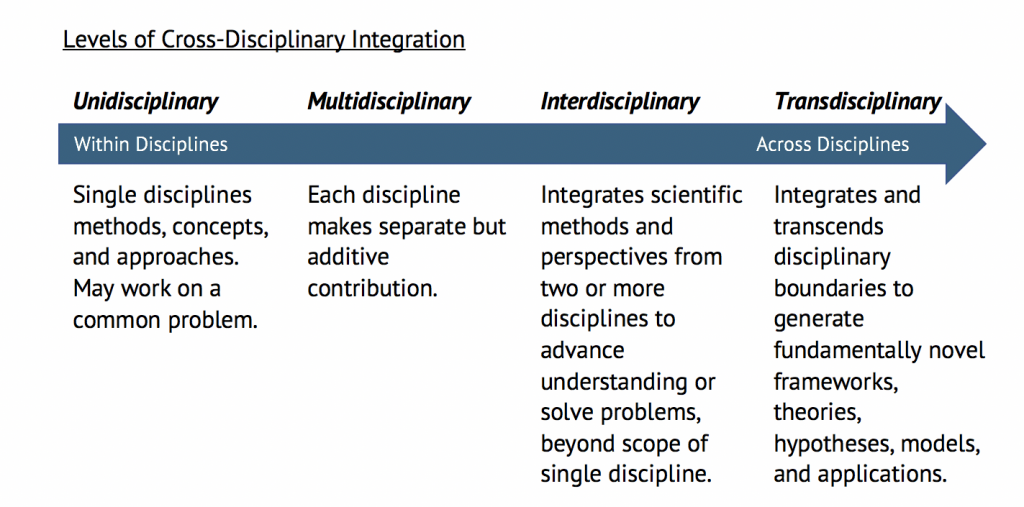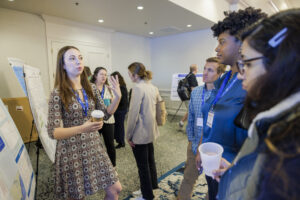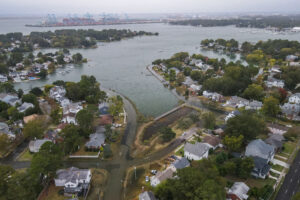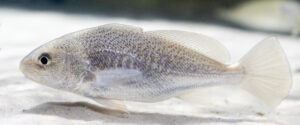Better teamwork for better solutions
Complex issues require multifaceted solutions. This is especially true in coastal and marine environments, where sea-level rise presents new and confounding challenges for communities, their economies, and the environments they depend on. Novel solutions require more people bringing their insights to the table. This kind of teamwork calls for a deeper level of communication and integration between disciplines.
Team science is cross-disciplinary research where collaborators work interdependently to blend their skillsets and knowledge throughout the research. They bring their expertise to the table but go beyond their home disciplines to build new questions, approaches, and solutions to longstanding challenges.
 For multifaceted coastal and marine problems, team science can span public health, social science, engineering, design, law, and marine science. Each of these disciplines has its own methods, acronyms, and set of assumptions. Researchers must make it a point to explain concepts they usually take for granted. They must also be open to learning new concepts from other disciplines. This takes time, patience, and effort—but the results are worth it.
For multifaceted coastal and marine problems, team science can span public health, social science, engineering, design, law, and marine science. Each of these disciplines has its own methods, acronyms, and set of assumptions. Researchers must make it a point to explain concepts they usually take for granted. They must also be open to learning new concepts from other disciplines. This takes time, patience, and effort—but the results are worth it.
Young professionals are entering a workforce that demands more collaboration from funders, policy-makers, and managers. Yet today’s graduates aren’t always equipped with the teamwork skills they need for successful team science. Diverse teams require stronger communication and greater efforts to fully understand and incorporate each researcher’s skillset, background, and goals. Leadership and management skills can be critical to guide diverse perspectives, navigate group dynamics, and build cohesion. Large, diverse teams make team science more challenging, but also generate rich, inventive solutions.
Virginia Sea Grant sits at the boundaries of disciplines, sectors, and functions. Our organization is founded on integrating research, education, extension, and communication to address complex coastal and marine issues. With this expertise, VASG is perfectly positioned to help our universities overcome team science challenges.
In 2016, NSF awarded VASG a three-year grant to do just that. We are designing and testing this training in collaboration with the Virginia Institute of Marine Science (VIMS) and the University of Virginia (UVA), and experts on Team Science from the University of Central Florida and Virginia Commonwealth University. We are excited to expand our professional development opportunities to include this trailblazing research and leadership training.
VASG’s goal is simple: to better prepare the next generation of marine researchers, policy-makers, educators, and industry workers with better transdisciplinary teamwork skills. Only by strengthening these skillsets and crossing disciplines, sectors and, functions, can we produce novel, entrepreneurial solutions to challenging coastal and marine issues.
Building upon Virginia’s tremendous foundation of students, faculty, outreach staff, engaged stakeholders, and supportive leaders, VASG aims to enable new ideas and solutions that can only emerge from deep integration of diverse knowledge and perspectives. VASG works on cross-boundary issues with an eye toward improving team science capabilities in the Commonwealth. Together, we will help launch the next great leap forward in coastal and marine science.
VASG’s goal is simple: to better prepare the next generation of marine researchers, policy-makers, educators, and industry workers with better transdisciplinary teamwork skills.





